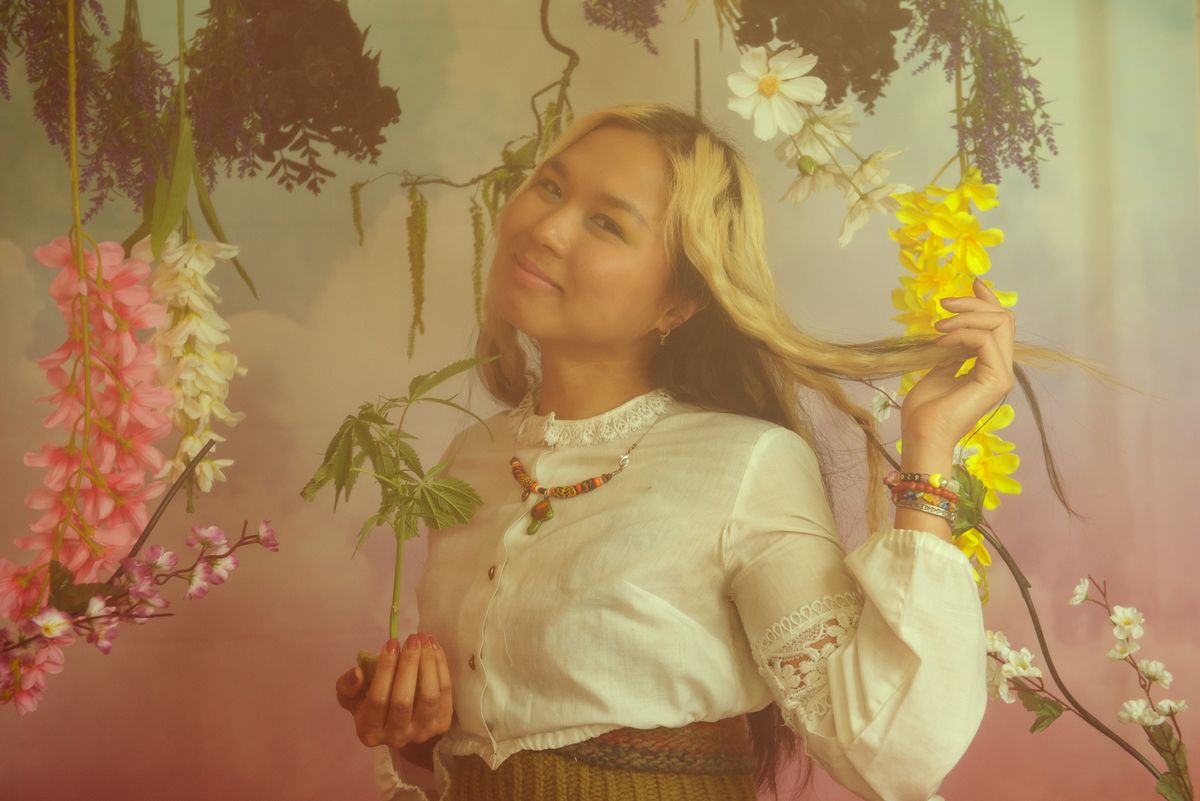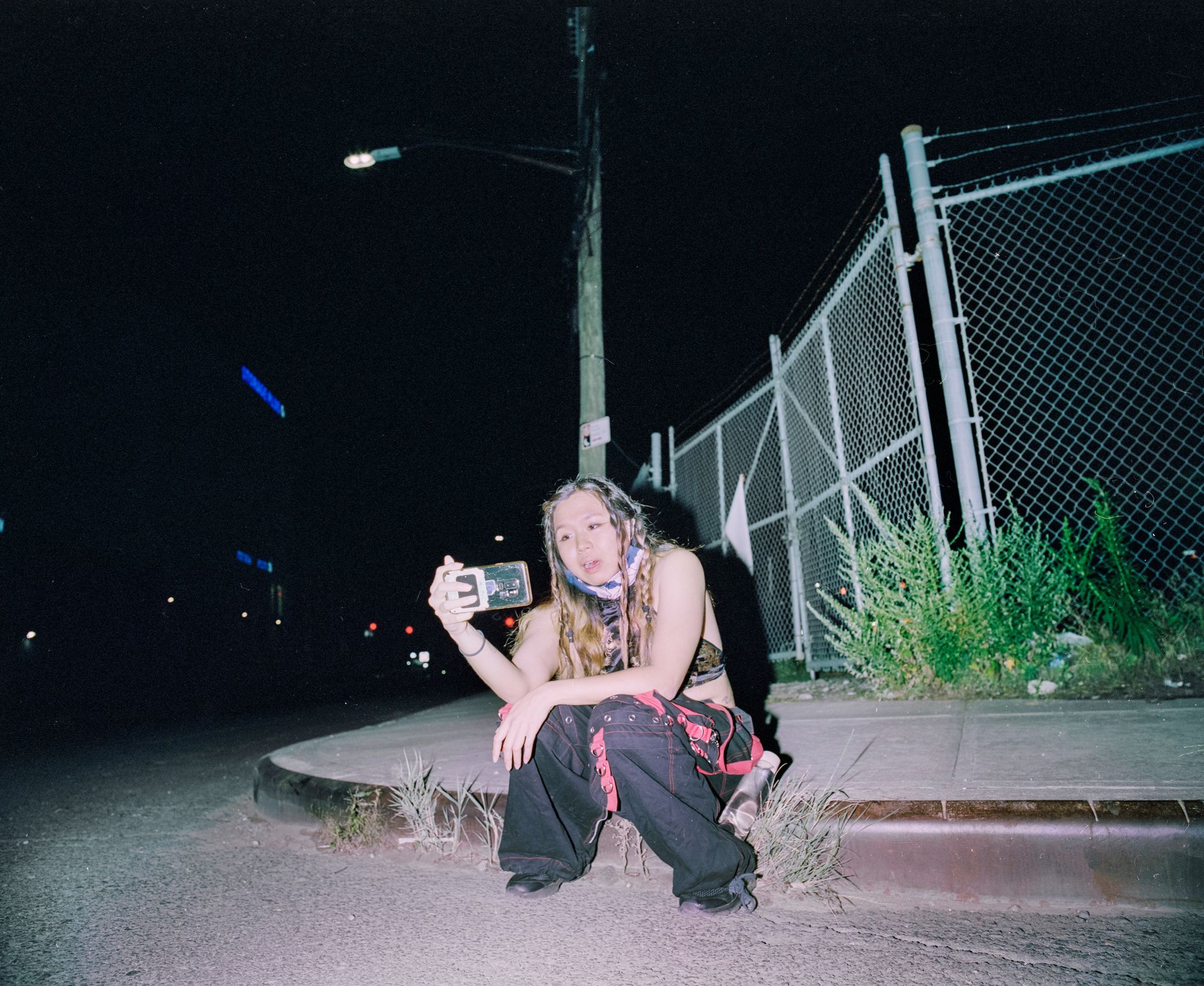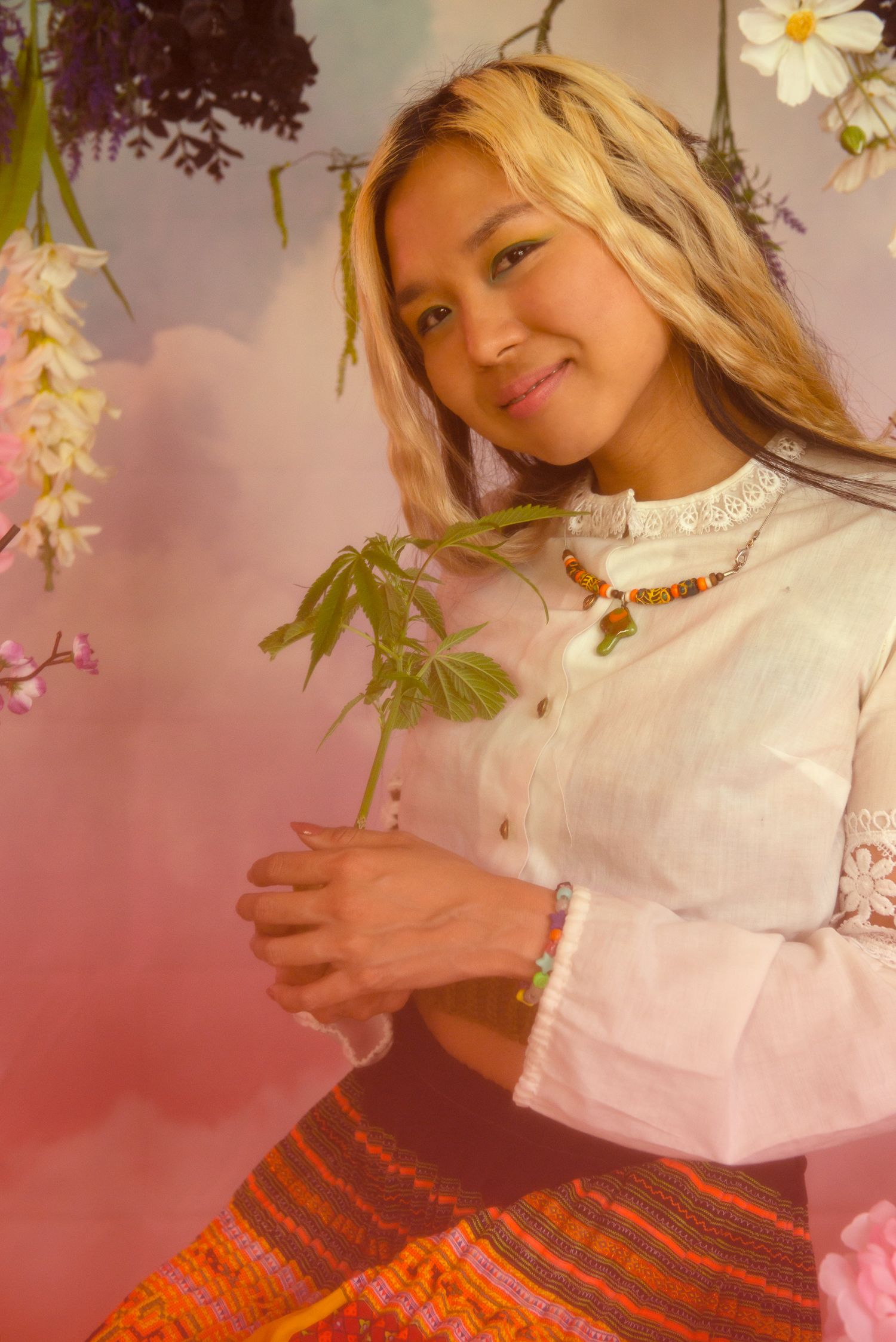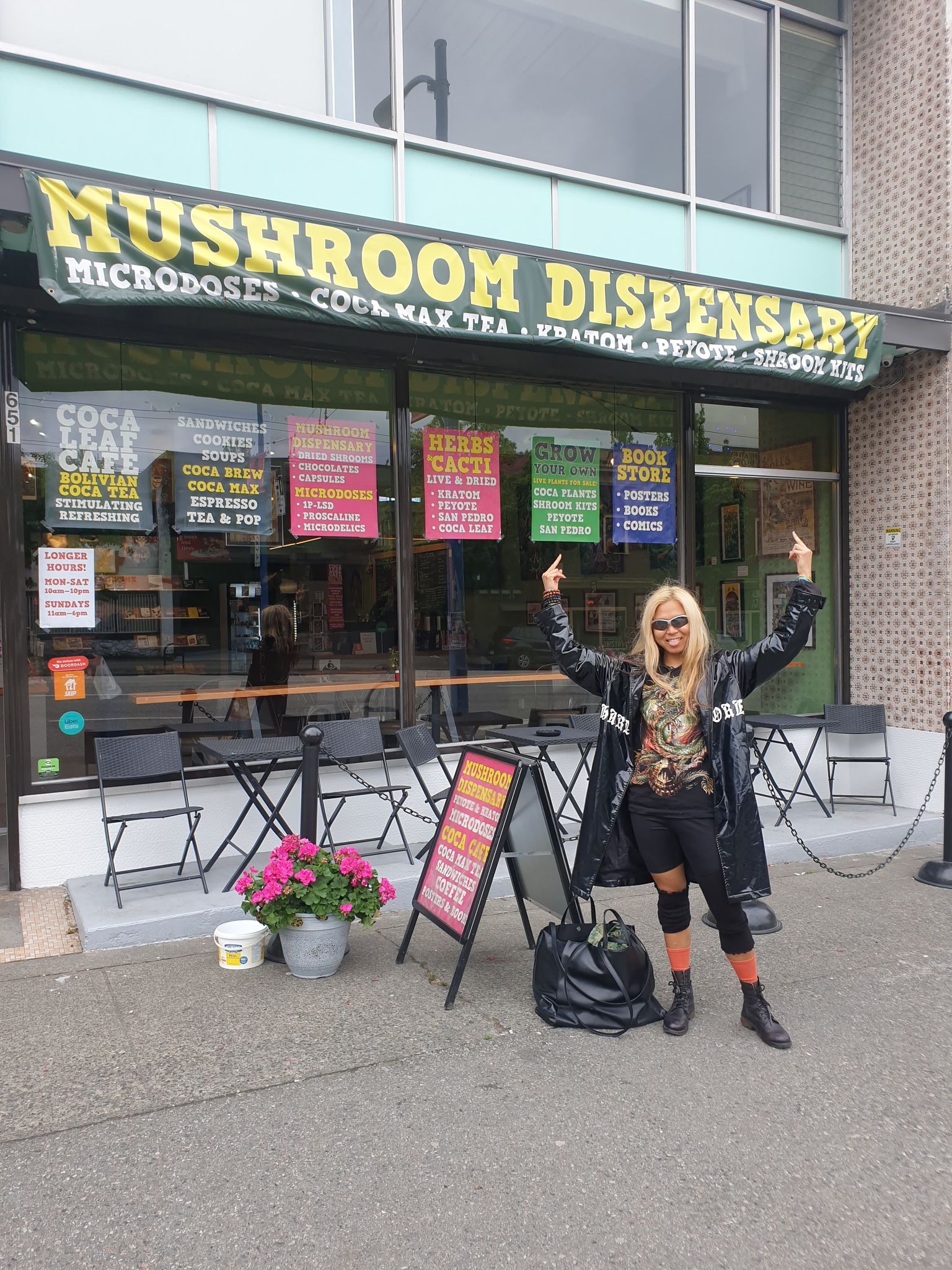Michelle Lhooq on Drugs, Death, and the Eternal Quest for Counterculture

This is a free post for Larry Fitzmaurice's Last Donut of the Night newsletter. Paid subscribers get a weekly Baker's Dozen newsletter featuring a playlist of music I've been listening to lately, along with some music criticism around it.
Oh, hey, speaking of paid subscriptions—in honor of everyone who gets high, I'm running a week-long 4/20 sale starting today until April 27 where I'm offering a 42% discount on annual subscriptions. That means that subscriptions cost (hits calculator-shaped blunt) $17.40. Sick. You can get that deal right here.
Alright, so let's get into it: I swear to god that I did not intend to publish this interview on 4/20 specifically, sometimes life just works out that way. Michelle Lhooq runs a great newsletter called Rave New World that zooms in on the counterculture, she's someone whose work and writing style I've greatly admired since we were both working at VICE, where I occasionally wrote for her over at Thump as well.
One reason why I wanted to talk to Michelle is because she wrote about music heavily early in her career and has since moved on to covering a wide range of other topics, from drugs and uprisings to clubbing and the counterculture at large. I've also always really been struck by the clarity of her writing style—she's very good at telling you about things like it is, and I found that our conversation went similarly too. Hope you enjoy:
So, I see your current beat now as pretty different from what you were doing when we were at VICE together. Do you think that's accurate?
Yeah, I definitely feel like it's been an evolution. Interestingly, I feel like I returned to nightlife through the filter of everything else I write about now.
Tell me your origin story as a writer. What got you in the game?
I moved to New York for college and started writing a lot of lifestyle and culture stuff—reviewing restaurants, stuff like that. One day I got a message from my homie Abdullah at VICE, and he was like, "We're starting a dance music site. Would you want to be involved?" I was like, "Holy shit. I can write about partying for a living? Is that even possible?" [Laughs] I jumped on, and it was such a wild era, because it was a time when a lot of people were still side-eyeing dance music—they thought it was all about David Guetta playing EDC or something. A lot of the battle was being taken seriously.
It was definitely such a formative era in terms of writing, for me. I got the courage to experiment with my style while still having the rigor of fact-checking and sourcing. From there, I expanded into writing more features and traveling a lot—going from everything to gabber festivals in the Netherlands to super-underground free techno raves.
I feel like, at a certain point, I started realizing that parties felt really predictable to me, and a night out watching a show just wasn't hitting the same way. Also, more pressingly, I was doing a ton of drugs, and I fell into that lifestyle because it's so easy to become a slave to the illusion that drugs help you become hyper-functional. In the neoliberal, marketplace we live in, it's so advantageous to be popping pills and doing lines just to keep up.
In 2017 or 2018, Thump decided to close, and I used that as a springboard to get to California and get sober. As soon as I arrived, cannabis was becoming legalized, and I was like, "Oh, wow." [Laughs] Here's a new frontier that I never thought was even possible, growing up in Singapore where drugs are super illegal. It was a total head-fuck, to be able to cover something that always felt fun and hedonistic as a professional career.
So I decided to write a book about the new frontier of cannabis, and I sort of became a weed reporter. I also started throwing "weed raves," where I brought in all these different elements of things that I thought would be interesting to do in a party setting—yoga, sound baths, DJ sets, performances, discussion panels. It was almost like a mini-festival.
A lot of the people in the cannabis industry started being pulled towards psychedelics in 2019 or 2020, and especially during the pandemic I started writing about and experimenting with a lot of these substances outside of party settings. The therapeutic mentality was really interesting to me—how psychedelics could be interwoven with sobriety felt like a really new approach. So I started throwing psychedelics parties as well! [Laughs]
My whole thing about the events side of my career is that parties are a space for me to put the ideas I've engaged with in my writing into practice. It's so interesting, it's almost like a social experiment for me to see how infusing different sets of substances into a social setting can shift the energetic field of a party and change how we relate to ourselves and each other. It's one thing to go to a hippie-leaning festival and do shrooms, but it's a different vibe to go into a setting where everybody is doing shrooms together, and to bring in brands from the gray and black market to show their products.
Of course, I have side-eye to the corporatization and gentrification of these substances, but there's part of me that also goes, "Fuuuuuck." [Laughs] It's pretty cool how some of these brands are totally rethinking the product and selling things that I didn't even know were possible. For example, at my last party, we had shroom gummies, which I think are so useful. [Laughs]
Along the way, I also started writing about protest culture and going out to different cities across the world in temporary autonomous zones, where people were squatting and barricading areas. That work relates to rave culture, and it's something I've always been seduced by—this fantasy of being able to drop out and create your own utopia, and how that very often disintegrates under the pressures of reality. Watching that sort of tension in person at a lot of these high-pressure post-George Floyd protests were really informative to me in understanding how subcultures work.
Everything came together a few years ago when I was like, "How does everything I write about fit together conceptually?" And I realized that I'm really interested in counterculture, and how it's evolving as a concept under all these crazy new realities we have—including the corporatization of these substances that we once considered inherently liberatory. Rave culture in the '90s, classic example, the way that it was viewed then is very different from today, where we have DJs collaborating with the biggest brands and becoming the faces of corporations. It's a really different landscape, and I'm driven by the question of, "Can there actually be a salient form of revolution in 2023?" [Laughs]

I followed your coverage of the 2020 protests and the autonomous zones that were established. Tell me about the experience of writing about these things that you were actively participating in as well. Community seems like a theme throughout your work, and protesting is essential to protecting your community.
There is no counterculture without community, right? What initially drove me to cover the protests was a friend of mine telling me that the Seattle CHOP was basically a music festival. [Laughs] At the time, clubs and venues were totally shut down, and I'd noticed a similar vibe at some of the Hollywood protests I went to, where rappers were filming music videos. I realized the protests became the place for all the sublimated feelings we typically release through music and partying.
So I went there with that angle in mind, but when I got there, it ended up being the dark part of the afterparty, when people are way too fucked up and maybe a fight—or ten fights—have broken out. A lot of the initial jubilation had disappeared because of several shootings, and what I found was a lot of houseless people—which became a different and fascinating beat, how the houseless crisis was intersecting with racial justice—and I started embedding myself into these communities because there weren't that many people left anymore, so it was easy for me to get to know some of the key players of the movement.
I was there the night that there was the last and final fatal shooting, which I hope is the only experience I ever have with gun violence in person. I think what I noticed about being embedded and living with these people, versus all the CNNs and Fox News's that came in with camera crews and sat on the periphery before being chased out of the area because people were really anti-media—it was my first time being in the middle of a breaking news story, and seeing how different the perspective from those journalists were versus the people living there and livestreaming the event, as well as the underground media types spending a lot more time being on the scene.
Of course, there were a few writers from mainstream media outlets that actually came through and did interviews and were there for more than a few minutes, but I definitely noticed a bifurcation between the newer media type folks—people who had podcasts and Substacks and Twitch channels—and older establishment media, who kept more of a remove. I found myself identifying more with the Twitch streamers! [Laughs] I felt like they weren't putting up a false barrier between themselves and the protestors. They were kids, just like me! It gave me a more realistic perspective on what was going on.
I was really inspired by streamers like UnicornRiot, who were out on the streets every single day, streaming the violence, and they'd been doing this for many years. It opened my eyes to a different kind of reporting that I don't think I paid as much attention to during the pandemic.
You're running an independent publication, as am I. In terms of autonomy, what we're doing is as far from what it's like to work for a place like, say, VICE, as it gets. What's the benefits and struggles of that autonomy?
Starting a newsletter during the pandemic was initially a bit of a panic move. I was like, "Fuck, all the magazines and publications I've written for in the past aren't commissioning as much, or they're folding. Let me start my own thing." I immediately noticed that a lot more friends and people in professional circles were reaching out and reading my work more than they were with a piece I'd write for a publication that might not be on their reading list. There was more of a personal connection.
I really love the flexibility of being able to jump on a train or a plane and go somewhere with the money I was making. I was in New York once, I was writing about the re-openings of nightlife after the lockdowns were lifted, and someone was like, "There's some shit going down right now with a homeless encampment in Philly that's trying to fight for housing rights." I was like, "Wow, I'd love to go," and I immediately put out a call on my Substack, raised the money for a ticket, and I just went. That would've never happened if I pitched it. It would've taken weeks for an editor to reply, and we would've had to go back and forth about the rate and logistics. It would've taken too long. So the dexterity of the Substack model is amazing.
But it also became really scary sometimes, when I was on the field and didn't have a legal team to protect me if stuff went south—or even an editor to look over my shoulder and say, "Well, maybe this thing you want to write is a little problematic, or you should fact-check this a little harder." It felt like I was taking a lot of risks without a safety net. I know Substack says they have a legal team that can help you...[Laughs] But it still feels like you're very much alone.
The revenue can be such a rollercoaster, too. Some months I make enough to pay my rent and then some, and some months I make less than half of that—and I don't even know why! [Laughs] It doesn't even correlate to the number of posts I'm writing, or the quality of the work I'm putting out. It really seems random, and I can't quite tell how much I'm going to make every month, which is obviously terrifying. Hopefully, the future of this model is people collaborating with other creators more. I don't want to say that we have to find a way to replicate the magazine model, because that's obviously not it either, but I like the idea of collectives where different writers can step in and fill in the gaps if you're busy, so your readers still get quality material in the realm of interest they're looking to you for.

Tell me about observing post-pandemic nightlife.
Like everybody, I came back to the dancefloor so excited to have that moment where the feeling hits and you're like, "OK, I'm back!" I just felt like I was chasing a ghost. I was running through all these nightclubs, searching for that moment of euphoric transcendence. That doesn't happen all the time, but anyone who's been to a really good rave knows exactly what I'm talking about, and it's the high I'm always chasing.
The dancefloor felt really fragmented, people weren't really locking into the groove, there was a lot of dark drug use happening. It was also interesting to see the dominance of ketamine on the dancefloor. Previous to the pandemic, ketamine was also really popular, but I don't think it really took over until post-2020. The thing about ketamine, as much as I personally love doing it and think that it has a lot of potential as a therapeutic medicine, is that it's objectively not the most social drug.
You talk to old-school ravers who have been around for one or two generations before this, and they're like, "Back in the day, when everyone was just drinking and doing molly and cocaine, people were actually looking each other in the eye and talking." These days, the Gen Z kids would rather be totally numbed out, disassociated, and off their heads. Which is also fun! I'm not gonna knock it completely, but it's a different vibe, and I think you can feel it a lot on the dancefloor these days, especially in New York.
I also ended up going to Berlin, because I was like, "OK, if I can't catch the vibe in New York, maybe it'll be in Berlin"—and Berlin ended up being even more hellish! [Laughs] Berlin nightlife has become a fucking meme, a total cliché and caricature of what it is. I blame a lot of things on the gentrification of nightlife, and how it's become kind of cringe.
Obviously, a lot of people woke up to how important nightlife and coming together is during the pandemic, because it wasn't available—so I don't blame everybody for rushing out and wanting to have a party experience. But the floodgates opening and it becoming more accessible made it more of an entertainment to people—something you see on TikTok that people are doing because it's hot, instead of connecting to the feelings of communion and, dare I even say, subversion. [Laughs]
I still feel like I haven't found the feeling I'm looking for, but I also know it's happening out there. I don't think the dancefloor is spiritually vacant everywhere—I just think it's harder to come by these days, and a lot of it depends on passing down traditions and values of the culture that we've also inherited from our previous generations. I really think of it as a ritualistic practice, where you have to understand what's going on in order to embody and practice it. I think people like Mackenzie Ward, who just wrote a book called Raving—books like that are going to be helpful for the younger generation to understand what it is about the culture that we're all attracted to. It's so fun, but it can be meaningful beyond the level of taking drugs and losing your head, too.
You've been in some pretty intense situations, coverage-wise. How do you manage all of that emotionally?
The thing about trauma and baggage and emotions is that they're like an invisible cloak. You don't even realize it's there at all until, one day, you try and shrug it off a little more and you're like, "Oh!"
I witnessed a lot of death over the pandemic. On the streets, death was the dominant vibe as far as what the protests were around. Also, protesters were getting killed, so I would go to their funerals. Quite a few people that I knew who passed during the pandemic were actually drug overdoses, which definitely complicated the way that I write about drugs. Previous to that, I'd never known anyone who overdosed. So I definitely had some crisis moments. "I'm writing about this thing that's killing people." Obviously I'm not out there advocating for addiction, so it's different, but it kind of fucks with your head.
I knew that I was finally coming out of the darkness when I felt like I could throw a party again. That was the moment where I was like, "I have the emotional resilience and spiritual strength to throw an event," which is the most stressful thing anyone can do—bringing together people and aligning a million different factors so that everything happens in a precise time and space, and taking on an enormous risk of doing a psychedelics-oriented event in a state where it's not yet legal.
It was a lot of stress, but I felt like I needed to do it because I've become such an advocate for psychedelics as a tool for mental health. It was the really deep trips on mushrooms that brought me back to the space of death and let me understand how beautiful death can be sometimes. It oriented my understanding of death. I wouldn't have been able to have the shift in perspective—to really excavate some of the emotional trauma that I was carrying—without lying in bed, alone, on five grams of mushrooms. If I can create a space where people can dip their toes into psychedelics and understand what it means to do it in a communal setting, which can also be really beautiful, then I'd love to open that space. It was amazing and surprising to me how many people tried shrooms at the shroom rave! [Laughs]
I think a lot about how mushrooms come from decay. They're really rooted in the earth, and they come out of decomposing matter—they come from shit, and filth. There's something really beautiful about that metaphor. As I said before, they bring you back to a space of death and connect you to rebirth. And they also remind you that transcendence can happen within the filth. It's not a bougie drug! [Laughs]

Tell me about misconceptions you've faced, or that you think you might face, when it comes to your work.
So many. [Laughs] Sometimes I feel insecure about whether I'm perceived as a controversial, troll-baiting writer on purpose. That I'm courting controversy in order to be edgy. Maybe I just live on the fringe, and I find this shit to be super interesting and kind of normal to me, and that's why I want to explore it—for other people to understand that the things they see as peripheral or stigmatized or strange actually have a lot of history and culture to them.
But one of the hardest things I had to navigate in the beginning of my career, especially when it came to underground music scenes, is people feeling like I was blowing up the underground. I always came at it as not telling anything that people aren't already putting on social media, and I'd never give away locations or names, or anything that could actually lead authorities to places. No one has ever been busted because of a piece I've written, but so many people are still so scared that will happen. Which, now that I throw psychedelic parties myself, I understand that fear a lot more—but it's not so black and white, and any writer that covers the underground has to come up with their own code of best practices.
How do we write about this thing that we love while still protecting it, and also historicizing it in the way it deserves to be? It's a really complicated dance around those tensions, but it's been really interesting, because as the music and the scenes I've covered have blown up, there's not as much gatekeeping around their disclosures anymore. It's almost the opposite—people are really happy to have you write about their raves now.
Now, the new tension is disclosing that you do the drugs you write about. That can be seen as edgy now—even in 2023, when those drugs are legal now. The people who founded these companies would be happy to tell you that they do them, but as a journalist, it's different, I understand. I think people sometimes might conceive me, in its most grotesque caricature, as a party girl who's just doing drugs all the time, writing about things in a way that's too close to the story, without that layer of objectivity in traditional journalism.
I'm so immersed, and there is no boundary oftentimes between the personal and the professional to me—my life is my work, and I am living this life that I am writing about and covering. But I've always found it useful to viscerally experience what I'm reporting on. My body is the vessel through which I understand the world. That first-hand experience has always made my work more rich.
I go out in the psychedelic world and I go, "None of you have ever done mushrooms outside of, like, a healing circle in the Amazon." Which is great! But there's so much more to the culture than that, and I think it helps beat down a lot of the elitism around these substances when you try them in therapeutic, medical, and recreational settings. Right now, I feel like I'm the writer in the psychedelic world who's really advocating for the value of recreational use, and I think sometimes these more professionalized people are like, "She's just a party girl," you know?